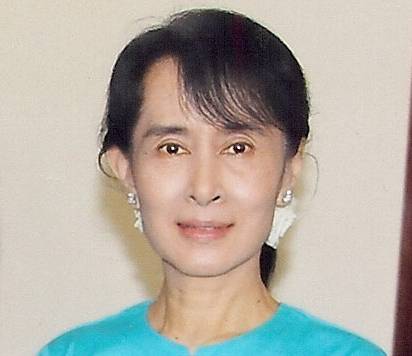
FAQ About Aung San Suu Kyi

Who is Aung San Suu Kyi?
Aung San Suu Kyi is a prominent Burmese political leader and Nobel Peace Prize laureate recognized for her non-violent struggle for democracy and human rights in Myanmar. She has been a significant figure in Myanmar's political landscape and has played a crucial role in the country's efforts toward democratization.

What are some of Aung San Suu Kyi's major achievements?
Aung San Suu Kyi is best known for her leadership of the National League for Democracy (NLD) in Myanmar and her advocacy for democracy and human rights. She was awarded the Nobel Peace Prize in 1991 for her non-violent struggle against military rule in Myanmar. Under her leadership, the NLD won a substantial number of parliamentary seats, leading to significant political reforms.

When did Aung San Suu Kyi receive the Nobel Peace Prize?
Aung San Suu Kyi was awarded the Nobel Peace Prize in 1991. She received this honor for her peaceful and non-violent struggle for democracy and human rights in Myanmar, becoming an international symbol of peaceful resistance in the face of oppression.

What role did Aung San Suu Kyi play in the National League for Democracy?
Aung San Suu Kyi co-founded the National League for Democracy (NLD) in 1988 and has served as its General Secretary. Under her leadership, the NLD has become one of Myanmar's most significant political parties, advocating for democratic reforms and challenging military rule.

How has Aung San Suu Kyi contributed to Myanmar's political landscape?
Aung San Suu Kyi has played a critical role in Myanmar's transition from military rule to partial civilian governance. Her leadership in the NLD has been crucial in instigating political reforms, especially following the general election victory in 2015 when the NLD won a majority in parliament. Her efforts have focused on advancing democracy, although her tenure has faced both domestic and international criticism.

Why is Aung San Suu Kyi a controversial figure?
Aung San Suu Kyi has been a controversial figure due to her perceived inaction and silence regarding the Rohingya crisis. Her government's handling of the situation, which has been described as crimes against humanity, has attracted widespread international criticism. Despite her past as a human rights icon, this controversy has tarnished her global reputation.

What led to Aung San Suu Kyi's house arrest?
Aung San Suu Kyi was placed under house arrest by Myanmar's military government on several occasions between 1989 and 2010. Her arrests were aimed at suppressing her political activities and influence as she emerged as a key figure opposing the military regime.

How long was Aung San Suu Kyi under house arrest?
Aung San Suu Kyi was under house arrest for about 15 of the 21 years from 1989 to 2010. Her prolonged detentions were measures by the military government to curb her influence and political activism in Myanmar.

What challenges has Aung San Suu Kyi faced in her political career?
Aung San Suu Kyi has faced numerous challenges, including long periods of house arrest, suppression by Myanmar's military junta, and, more recently, criticism over her handling of the Rohingya crisis. Despite these challenges, she has remained a central figure in Myanmar's political scene.

What is Aung San Suu Kyi's background and education?
Aung San Suu Kyi was born on June 19, 1945, in Yangon (formerly Rangoon), Myanmar. She is the daughter of Myanmar's independence hero, General Aung San. Suu Kyi pursued higher education at the University of Oxford, where she studied philosophy, politics, and economics. She furthered her education in India and the United States before returning to Myanmar.

What positions did Aung San Suu Kyi hold in Myanmar's government?
After the NLD's victory in the 2015 elections, Aung San Suu Kyi took on several important roles in Myanmar's government, including State Counsellor (a role akin to Prime Minister), Minister of Foreign Affairs, and Minister for the President's Office, significantly influencing the country's political landscape.

What is the significance of Aung San Suu Kyi's role as State Counsellor?
The role of State Counsellor was created specifically for Aung San Suu Kyi to allow her to exert significant influence in the government. As State Counsellor, she had authority similar to that of a head of government, circumventing the constitutional prohibition against her becoming President due to her foreign familial ties.

How did Aung San Suu Kyi's leadership impact Myanmar's democratization process?
Aung San Suu Kyi's leadership was pivotal in Myanmar's journey towards democratization. Her advocacy for peaceful change and reform helped catalyze transition efforts from military control to a civilian government in the early 2010s. Her leadership in the NLD's success in the 2015 elections was seen as a critical step towards democratic governance in Myanmar.

What is Aung San Suu Kyi's connection to General Aung San?
Aung San Suu Kyi is the daughter of General Aung San, a revered national hero who played a key role in Myanmar's fight for independence from British colonial rule. Her father's legacy has been a significant part of her identity and influence in Myanmar's political landscape.

Why was Aung San Suu Kyi unable to become the President of Myanmar?
A clause in Myanmar's constitution, believed to be drafted specifically to prevent her from becoming president, disqualifies anyone whose children or spouse hold foreign citizenship. Aung San Suu Kyi's two sons are British citizens, thus barring her from the presidency. The position of State Counsellor was created to allow her to guide the government's efforts.

How did Aung San Suu Kyi's international reputation change over time?
Aung San Suu Kyi was once celebrated worldwide as a courageous human rights defender. However, her reputation has suffered due to international criticism over her government's handling of the Rohingya crisis, leading to a complex reassessment of her role and legacy in global public opinion.

What has been the international community's response to Aung San Suu Kyi's actions regarding the Rohingya crisis?
The international community has largely condemned Aung San Suu Kyi's handling of the Rohingya crisis. Her perceived failure to address military actions against the Rohingya minority and her defense of the military in international forums have resulted in significant reputational damage and calls for the revocation of some of her honors.

How have Aung San Suu Kyi's leadership and policies affected Myanmar's economy?
During Aung San Suu Kyi's leadership, Myanmar sought to open its economy to foreign investments and improve economic conditions through reforms and development projects. While there was initial optimism, economic challenges persisted, including slow economic progression and continued issues with corruption and infrastructure.

What are some criticisms of Aung San Suu Kyi besides the Rohingya issue?
Besides the Rohingya issue, Aung San Suu Kyi has faced criticism for failing to make significant progress in democratization processes, addressing ethnic conflicts, and implementing comprehensive economic reforms. Critics argue that her government has not been effective in reducing military influence in governance and addressing human rights concerns comprehensively.

What has been Aung San Suu Kyi's role in recent political developments in Myanmar?
In recent years, particularly after the military coup in February 2021, Aung San Suu Kyi has remained a central figure. She was detained by the military, which accused her of various charges, sparking widespread protests and international concern. Her arrest has galvanized opposition movements and discussions about Myanmar's political future.
